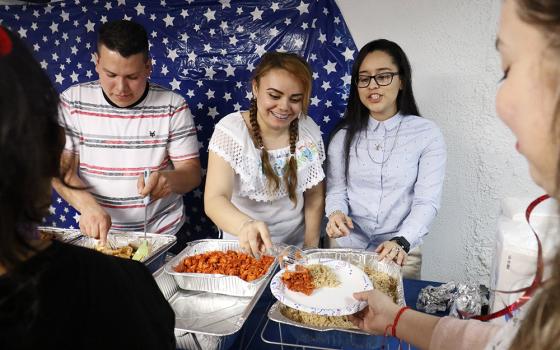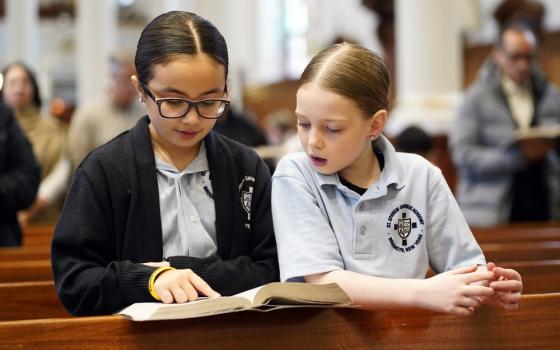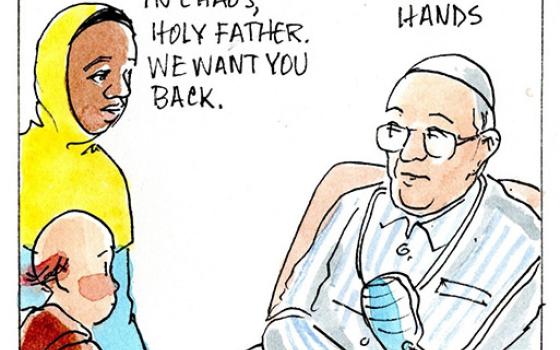
WASHINGTON -- While almost all of the media's attention has been focused on the presidential race, several key House and Senate races may prove just as likely to determine the shape of politics in Washington over the next few years. And, just as Catholics have become the quintessential swing voters in the presidential race, many of these critical House and Senate races also have a Catholic angle.
{C}
Topping the list is the Indiana Senate contest. The Democratic candidate is Congressman Joe Donnelly, who represents a district that includes that cultural icon of U.S. Catholicism, the University of Notre Dame. Donnelly is one of the few pro-life Democratic members of Congress, and while voters, even Catholic voters, rarely list abortion as a primary issue for them, it is a kind of cultural talisman for moderation.
Donnelly voted in favor of the Affordable Care Act and nonetheless won re-election in 2010 in a district not known for championing liberals. The Republican wave that year knocked off many other pro-life Democrats, including Pennsylvania's Kathy Dahlkemper, Ohio's Steve Driehaus and Virginia's Tom Perriello. All voted for the act and all were swept from office by the tea party backlash as well as ads specifically attacking them on the abortion issue. Donnelly managed to survive, winning re-election by a margin of 2,500 votes. To give you an idea of how costly the Affordable Care Act vote was, in 2008, Donnelly had won with 67.1 percent of the vote, beating his Republican challenger by more than 100,000 votes.
 President Barack Obama also won Indiana in 2008, but he is not likely to repeat that accomplishment this year. The most recent poll has Gov. Mitt Romney winning the Hoosier state by 16 points.
President Barack Obama also won Indiana in 2008, but he is not likely to repeat that accomplishment this year. The most recent poll has Gov. Mitt Romney winning the Hoosier state by 16 points.
In Indiana's Republican primaries, six-term Sen. Richard Lugar was defeated by tea party favorite and current State Treasurer Richard Mourdock. Lugar was chastised for being too willing to cut deals with Democrats. After his win, Mourdock said, "I certainly think bipartisanship ought to consist of Democrats coming to the Republican point of view." Despite this extreme stance, Mourdock is leading in the most recent poll by 2 points.
"In 2010 we saw the political slaughter of moderates in both parties, which hit Catholics and Catholic policy concerns especially hard," said Stephen Schneck, director of The Catholic University of America's Institute for Policy Research & Catholic Studies in Washington. "Politically motivated redistricting further worked to shed moderates from both parties. The media environment encouraged voters to look at policies through extreme ideological lenses. The funding sources for both parties were controlled by groups insisting on non-negotiable litmus tests."
Schneck notes that, in Indiana, the Democrats bucked these trends, nominating a culturally conservative, pro-life candidate, while the GOP succumbed to the trends, nominating a tea party darling over an accomplished and quite conservative Lugar. "After the tea party makeover of the GOP since 2010, compassionate conservatives are now as rare as hen's teeth," Schneck said.
Pennsylvania Sen. Robert Casey's career has tracked the ups and downs of the Democratic Party's relationship to the pro-life issue. His father, a wildly popular governor, was banned from speaking to the Democratic National Convention in 1992 because of his pro-life stance. Casey lost a 2002 gubernatorial primary to Ed Rendell, a battle that was fought in part on the issue of abortion rights. But in 2006 Democratic leaders convinced pro-choice groups to back a Casey bid. He faced nominal opposition in the primary and went on to defeat incumbent Republican Sen. Rick Santorum by 18 points in the general election. It was the first time Pennsylvania had elected a Democrat to a full Senate term since 1962.
In the Senate, Casey has championed a variety of issues that appeal to progressive Catholics while continuing his efforts to make the party more responsive to pro-life concerns. A prominent supporter of the Affordable Care Act, Casey led the effort to include the provisions of the Pregnant Women Support Act in the health care law, millions of dollars that will assist women facing crisis pregnancies. If support for the act was enough to doom dozens of Democrats in 2010, Casey's support has not put a dent in his re-election prospects. The RealClearPolitics average of polls has him leading by more than 13 percent.
Democrats for Life is trying to get the Democratic National Convention to adopt new language on abortion in the party's platform, taking more of a "big tent" approach to the contentious issue. A representative of the group will speak before the party's platform committee this month. But prospects for a change are doubtful.
"Some pro-life Democrats are trying to return the Democratic national platform to the Clinton-era language ('legal, safe and rare') on abortion, but NARAL and Planned Parenthood appear to have a veto over any change in language," said Jesuit Fr. Thomas Reese of the Woodstock Theological Center at Georgetown University in Washington. "They hate 'rare' because it implies there is something morally wrong with abortion."
Donnelly may be acceptable in Indiana and Casey a star in Pennsylvania, but at the national level they are outliers and pro-choice groups are deeply entrenched, not least because of their fundraising prowess. "The number crunchers have decided it is more cost-effective to spend money getting out your base than it is trying to win over the true independent," Reese said.
If the Democrats are unlikely to become a "big tent" party on abortion, the Republicans seem less likely to become "big tent" on anything. Reese warned, "There is no way the Republican Party can go for the big tent strategy. The Republican conservatives are more doctrinaire than '60s liberals. If the Republicans lose, next time they will nominate a really rabid conservative because the conservatives are convinced that the Republican Party is not winning because it is too wishy-washy."
Fred Rotondaro, chair of Catholics in Alliance for the Common Good, agrees, but he cites tea party intransigence on taxes as the chief sign of their "my way or the highway" approach. "For years, Democratic candidates were afraid to talk about taxes because if voters go into the voting booth thinking of themselves as taxpayers, they tend to vote Republican," Rotondaro said. "If they go into the booth thinking of themselves as workers, they vote Democratic. This year, finally, that has changed and Democrats may own the tax issue because Republicans have become so doctrinaire and, furthermore, because income inequality is so glaring, taxes have become a fairness issue again."
The most recent Washington Post/ABC poll confirms this: Obama was leading Romney on taxes by 46 percent compared to 45 percent, the first time in more than 40 years that a Democrat got higher marks on the tax issue than a Republican.
As Schneck noted, partisan redistricting, which doesn't affect the Senate, has driven both parties toward their extremes as many candidates in "safe districts" only worry about a primary challenge and are virtually assured a victory in the general election. Some Democrats from swing districts face tough battles every election, such as Congressmen Mark Critz and Mike Doyle from western Pennsylvania. In Michigan's First District, long held by Rep. Bart Stupak, who retired in 2010, Gary McDowell is trying to win back the seat for the Democrats. In all three districts, the Obama administration's struggle with Catholic organizations over the Health and Human Services mandate on contraceptive health care coverage may weigh heavily against their chances. On the other hand, these same swing voters appear distrustful of Romney.
A recent Pew poll showed a majority of Catholics supporting the bishops on the issue of religious liberty but nonetheless continuing to support Obama for re-election. Conservative Catholic voters in western Pennsylvania and Michigan's Upper Peninsula may care as much about Obama's saving the auto industry as they do contraception mandates.
Interestingly, RealClearPolitics' list of the 50 House seats that are most likely to change hands shows a glimmer of hope for the Democrats. Only 20 of the 50 seats are currently held by Democrats, 28 seats are held by Republicans and two contests have incumbents from both parties thrown together in newly configured districts. The Democrats need to pick up 26 seats to take back control of the House.
These races for House and Senate seats, as much as, if not more than, the presidential contest, will determine the shape of politics in the years ahead.
[Michael Sean Winters writes the Distinctly Catholic blog for the NCR website NCRonline.org/blogs/distinctly-catholic.]



